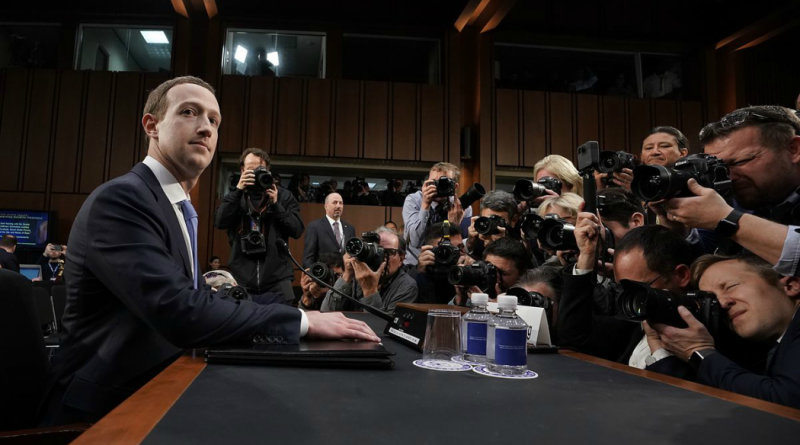Opinion: Who Is Watching? The Personal Price We Pay For Facebook
![]() Mary McLoughlin
Mary McLoughlin
Contributing Writer
We sign up for Facebook and other social media because, to some extent, we want to see and be seen, to know and be known. I remember making my Facebook account in eighth grade. My mom was worried about the risks of letting her 12 year old put herself out there. She made me agree to friend her so she could watch and make sure everything I posted was safe and appropriate. Being able to watch me gave her comfort.
I remember thinking that she was worrying about nothing. Again and again, she reminded me that once something was on the internet, it stayed there forever. I wasn’t too concerned. It didn’t matter to me who saw the “Twilight” fan pages I liked or the mirror selfies I had posted from the mall. There was nothing I felt like I had to hide from the world and so much of myself I wanted to share and to explore.

In those early days of social media, when we were all just dipping our toes into this new and more public world, it seemed everyone’s biggest worry was that some potential employer, college admissions officer, or priest somewhere would see the wrong thing.
But now, after Facebook has been accused of allegedly leaking the information of 87 million people to Cambridge Analytica, a political analysis firm, our greatest fear is that someone could see everything.

The New York Times broke the story of how Cambridge Analytica used the data of 87 million Americans right before election season to understand voter’s psychological traits and develop profiles about their religious, political, and cultural behavior. This data was utilized to structure a presidential campaign that better targets its audience. The information Facebook had recorded on its users paired with information Cambridge Analytics allegedly obtained illegally allowed the political consulting firm to understand the voting demographic in intensely personal ways.
The algorithms Facebook uses to develop advertisements develops a shockingly in-depth personality sketch. It’s been years since I’ve actually made a Facebook status, and I haven’t uploaded any pictures since prom, so I was pretty sure Facebook couldn’t know me too well. I was wrong. I went into the advertisement settings to see what data Facebook had collected on me. It knew I was liberal and lived away from home.
Even more jarring, from the data it collected on the kind of links I clicked on, Facebook not only knew all my food interests, but it knew my love interests too and guessed that I was gay before even my family did.
&’ async type=’text/javascript’>&’ async type=’text/javascript’>&’ async type=’text/javascript’>&’ async type=’text/javascript’>&’ async type=’text/javascript’>&’ async type=’text/javascript’>&’ async type=’text/javascript’>&’ async type=’text/javascript’>&’ async type=’text/javascript’>&’ async type=’text/javascript’>&’ async type=’text/javascript’>&’ async type=’text/javascript’>&’ async type=’text/javascript’>&’ async type=’text/javascript’>&’ async type=’text/javascript’>
In Other ✈ news…
>>Relay For Life: UD Students Raise Money For American Cancer Society
>>A Letter From The Editor: The Aftermath Of St. Patrick’s Day
It didn’t matter that I had taken my parents advice not to post any pictures of myself with red solo cups, I, and the record of every guilty pleasure Odyssey article I ever clicked on, was on the internet forever.
I have never wanted to be the person who writes about how millennials are destroying themselves with technology and social media. I never understood my grandma’s intense paranoia that her face would end up on the internet and someone would see her. I didn’t cling to privacy in the same way she did, and the threat of the world’s gaze didn’t paralyze me because I didn’t think anyone had anything to gain from looking at the happy birthday wish I plastered on the wall of a vague acquaintance when I was in a generous mood. I’m still not sure what precisely is at stake with the lack of privacy on Facebook tied to Facebook or what my privacy is worth to me. But I’m angry that I’m not given the space to make these choices for myself, and I’m scared that we can’t know the consequences of this dissolution of privacy.
https://www.facebook.com/verge/videos/1780427851993550/
According to data collected by the Clerk for the House of Representatives, 137 million Americans voted in the 2016 election. If the Trump campaign truly had access to the personal data of 87 million Americans, that means they were able to know personally, and without consent, a demographic greater than half of all voters. Though it’s not clear precisely what this data meant to the election or the outcome it had on voters, I’m deeply uncomfortable with this invasive and intrusive overreach.
I do know that when I signed up for Facebook in eighth grade, I signed up thinking it was free. No one told me the price I had to pay was my privacy. When so much of the social media we access doesn’t cost any money for to the user to join, the user-base itself becomes the commodity.
&’ async type=’text/javascript’>&’ async type=’text/javascript’>&’ async type=’text/javascript’>&’ async type=’text/javascript’>&’ async type=’text/javascript’>&’ async type=’text/javascript’>&’ async type=’text/javascript’>&’ async type=’text/javascript’>&’ async type=’text/javascript’>&’ async type=’text/javascript’>&’ async type=’text/javascript’>&’ async type=’text/javascript’>&’ async type=’text/javascript’>&’ async type=’text/javascript’>&’ async type=’text/javascript’>
Though I’m not convinced it’s inherently wrong for platforms to profit off advertisements that target their user bases, I’m not okay with the fact that we all pay every day without ever being told the price. I’m not sure whether or not what we are giving of ourselves is worth the services we are receiving, but I do know that we should all be made aware of and agree to the price we’re paying.
I know that when I was 12, I was never told what was at stake. Facebook, and all other social media platforms, need to be held accountable and remain transparent about the data they are gathering and the places that data is going. It’s time for us to face this.
Photo Taken From recode.net.


